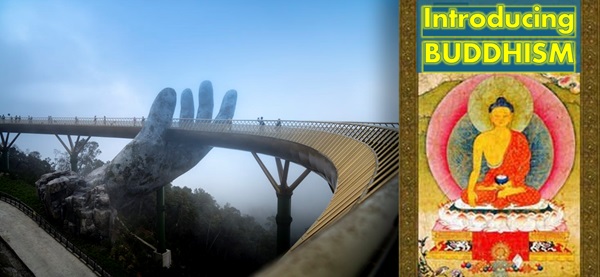Introducing Buddhism: A Bridge for Beginners
Tuesday 24 September @ 6:30 pm – 8:00 pm

Bridging beginners and in-depth study. Bridging Buddhist philosophy and our hectic daily life. Bridging altruistic intentions and our default emotional responses. Bridging a commitment to spiritual progress and our latent doubts and nagging cynicism. Bridging the inner life of potential and the external pressures of career and family. If any of these conundrums resonate with you, this course may be just the salve and salvation you were looking for!
Following the format of the in-depth Discovering Buddhism modules, this is an ideal bridging course between newcomers to Buddhism and in-depth study. Instead of a whole two months on each topic, we spend one evening on each, highlighting the essential points and how we can apply them in our life right now.
The classes are loosely sequential, but each session is a stand-alone topic. You are equally welcome to come along to just one class, to a few classes here and there, or to enjoy the course in its entirety.
This course is for you if:
– You have done a few beginner’s courses but are not yet ready for in-depth study
– You have read a few Buddhist books but want to get more direction in your practice
– You are looking for a concise Dharma course that covers the common topics on the path to enlightenment
This introductory course will set the necessary groundwork and encouragement to embark on further study, including the unique FPMT experience of Discovering Buddhism.
Presented by:
Please make a donation:
You can make your donation now online, or when you arrive on the on the day (with cash or card). Thank you for your generosity! Your donation helps keep LTC flourishing and providing courses such as this. (The Zoom link will appear at the top of this page 15 minutes before the start.)
*Course Package includes soundfiles of each class (to catch-up or re-listen), and any powerpoint slides or practice booklets.
“Don’t think of Buddhism as some kind of narrow, closed-minded belief system. It isn’t. Buddhist doctrine is not a historical fabrication derived through imagination and mental speculation, but an accurate psychological explanation of the actual nature of the mind.”
– Lama Thubten Yeshe
“Also, no matter how much education we have, if the inner factor of developing our mind is missing, if the practice of compassion is missing, again there’s no peace in our life. Even if we have learned every language and in the world, even if we have memorized and can explain all the Buddha’s teachings, if we have not transformed our mind, if we have not developed compassion for other beings, once more our life will be full of problems.”
– Lama Zopa Rinpoche



